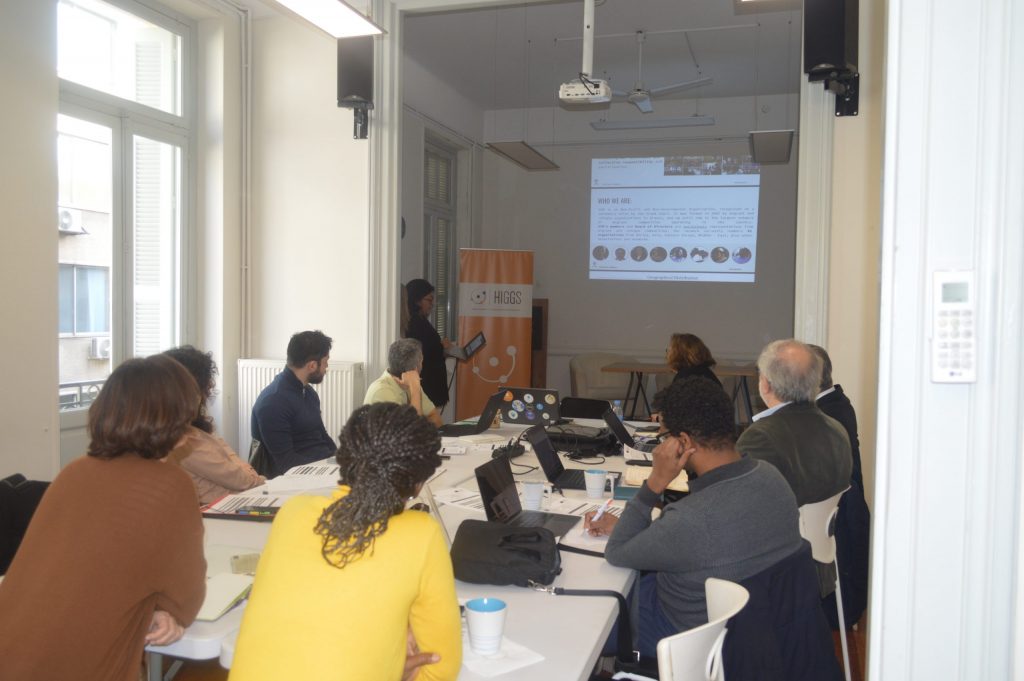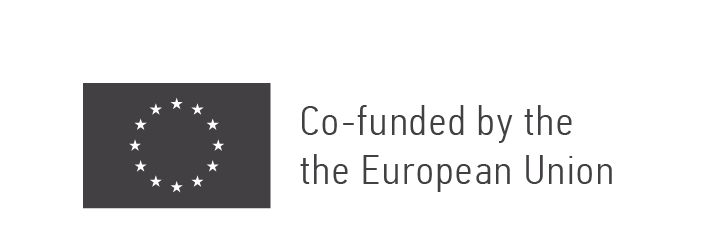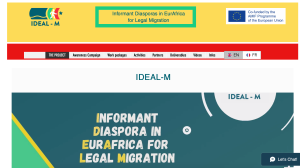The Project IDEAL-M aims to raise awareness about the dangers of illegal migration and misinformation about the journey to Europe as well as the actual conditions when reaching the hosting countries. It will focus on Senegal as a country of origin and would assess the needs of Senegalese people when arriving in European countries, especially Germany where there is a higher concentration of people from that origin.
Highlight the potentials for legal migration;
Provide actual information for those people who might be interested in migrating, through mobilisation of diaspora communities already settled in Europe. Are additional; objectives of the project.
As part of this information is controlled by smuggling groups, IDEAL-M aims to build upon this information by raising awareness of the actual risks of smuggling and of irregular migration and developing a counter-narrative in a wider range of media through campaigning and use of digital media and local press.
The project will assess the needs of migrants at local level and also the potential of diaspora communities in Europe but essentially in the partner countries.
IDEAL-M will develop in three phases:
Needs assessment and evaluation of media channels for effective campaigning;
Implementation phase where campaigning information will be designed and executed with tailor-made messages per target groups and utilise CSOs in Senegal as a supporting mechanism for dissemination and finally;
Creation of a wider network for possible collaboration that will touch upon policy levels and sustain campaigning dissemination.
The project is Funded by the European Union under the call Asylum Migration and Integration Fund (AMIF).
Led by the UNIVERSITY OF PELOPONNESE, in partnership with
UNIVERSIDAD AUTÓNOMA DE MADRID
AFRICAN MEDIA ASSOCIATION MALTA
P.R.S.D. – ASSOCIACAO, PROVEDORES DE RESPOSTAS SOCIAIS PARA O DESENVOLVIMENTO
MIGRAFRICA
GREEK FORUM OF MIGRANTS
HELLENIC AGENCY FOR LOCAL DEVELOPMENT AND LOCAL GOVERNMENT
For more information please visit the project website: https://www.ideal-migration.com
Kick-off Meeting, 29th of January 2020
Host: UoP, Athens, Greece
Attendees: UoP, AMAM, Migrafrica, UAM, GFM, EETAA
The meeting commenced with a welcoming address from Asteris Huliaras, Professor at the University of the Peloponnese and Scientific Coordinator of the project. Following this short opening the meeting’s agenda was followed.
Each member of the consortium presented itself and its organization. Each partner presented its main activities and strengths while it connected the IDEAL-M project with its strategic plans. At the core of all partners’ presentations was the fact that not only the topic itself but also the timing of IDEAL-M is ideal. Furthermore, all partners presented their experience with European projects highlighting that the consortium as a whole has a fair experience of such projects.
A thorough review of the approved proposal and the various Work-Packages (WPs) were given. The initial focus was on generating a common language and idea on the main aspects of the project as well as the required effort and respective timelines. The discussion focused more on the expected impact of the project and on the importance of selecting Senegal, as the principal project’s case study. While, it was mentioned that a post-doctoral researcher and a non-profit organisation have already expressed their interest for the project’s outputs, which from the very beginning increases the impact and sustainability of the IDEAL-M.
The participants have also discussed and planned the different work packages. The project has 5 work packages.
WP1: Management and Coordination of the Action
WP2: Initial Context and Environment Mapping
WP3: Target Groups and Communication Channels Assessment
WP4: Awareness Raising Campaign
WP5: Dissemination & Exploitation

Overview of Work Package 2
The principal objective :
Work package 2 aims to produce a consolidated mapping of the context and the environment inwhich the project will be implemented. It will focus on articulating in-depth know-how of links between diaspora communities in the consortium countries and potential migrants located in Senegal. In addition, it will map the connections between the different diaspora organizations in each country as well as potential intra-EU links. It will also focus on assessing the relationships of these organizations with other civil society organizations, public authorities and municipalities.
Specific objectives :
· Needs assessment analysis of the current environment in which diaspora communities work within host societies and their interaction with potential migrants and local stakeholders
· Review and analysis of best practices selected in consortium countries and abroad on integrating diaspora communities in addressing migration issues
· Draw conclusions and recommendations based on the results.
The activities and deliverables of work package 2 :
Activities :
2.1. Research and analysis of needs
2.2. Best practices analysis
2.3. State of the Art Report
Deliverables :
2.1 Research report and needs analyse
2.2 Report on the best practices
2.3 Report on IDEAL-M state-of-the-art
Overview of Work Package 3
Main objectives :
The work package 3 aims to a thorough assessment of the key target groups as well as media channels related to the project. Under WP3 the consortium analysed the typical prospective migrant from Senegal creating a series of target groups of the media campaign.
The work package 3 assesses the different communication channels available for launching the media campaign of the work package 4. Among the communication channels, one also found organizations and structures such as community centres and CSOs in Europe and in Senegal, that could be used as vehicles of reaching target audiences. However, because of the health issue caused by the Covid-19 pandemic, no trips could be done.
In a nutshell, this work package aims to identify the typical Senegalese that should be targeted by the information campaign and, as a second step, analyse the different channels available, identifying those that are more suitable for really reaching the target audiences.
The objectives of this work package are as follows :
• Target audiences assessment formulating a priority list on who the information campaign should target.
• Communication channels assessment formulating a list of the most prominent and expected mechanisms to reaching the relevant target groups.
• Draw conclusions and recommendations based on the findings.
Overview of Work Package 4
The principal objective:
WP4 aims to deal with designing, producing and launching the awareness-raising campaign of the Ideal-M project. It consists of 6 activities that will produce the required material and activities to transform the information material to messages compatible with the communication channels to be used.
WP4 involves a co-design approach to the creation of the information material, gathering contributions from different stakeholders and finalised by the follow-up of diaspora community representatives.
It is important to note that due to the current global pandemic, activities are delayed but our partners are working in coordination with Senegalese stakeholders to coordinate these activities for the upcoming visit to Senegal.
Specific objectives:
- Design of informational material covering all aspects of information required for offering a 360° coverage of knowledge
- Transforming informational material into media-friendly messages
- Implementing the information campaign
- Testing the effectiveness of the different channels utilized to reach prospective migrants.
Activiities:
4.1. Collection and control of required information on subject matter
4.2. Informational material workshop
4.3. Creation of communications plan and media-friendly messages
4.4. Creation of information material to be used by CSOs
4.5. Communication campaign execution
4.6. Communications Campaign Impact Analysis.
Deliverables:
4.1. Communication Plan (EN)
4.2. Communication campaign impact analysis report (EN)
4.3. Creation of information material (EN/FR + partner languages).
In order to properly implement these activities and results, focus groups are organised between all partners in their respective countries. (add information from the focus group).
The first focus group highlighted how Senegalese tend to take the western Mediterranean route rather than the central Mediterranean route.
Migrating, in Senegal, is a phenomenon related to gender and a certain transition in life (young men). Emphasis was also placed on how visa requirements are a barrier to legal travel.
Workshop in Malta
November 9th-11th, 2021
The workshop which was held in Malta with all partners participating , conducted an evaluation of materials collected, where campaigning information will be designed and executed with tailored-made messages per target groups and utilise CSOs in Senegal as a supporting mechanism for dissemination and finally to created a wider network for possible collaboration that will touch upon policy levels and sustain campaigning dissemination. The workshop was also a chance for the partner organizations to reflect on the milestones of the project as well as have a clear pathway on the remaining WPs.
The program included:
General Discussion: Arrival of partners. Action plan for the day will follow. (AMAM)
Project management meeting, both physical and online with EETAA from Greece
Information campaign main elements report. Look at specific issues peculiar to each country, such as trafficking, smuggling communities, role of diaspora- that is, how they influence the migration (UAM).
Target groups ass. Communication channels ass. Reports collected from the various country partners (Migrafrica).
presentation of Communication plan (AMAM)
Feedback on the Communication Plan (All partners)

The final Conference of the project:
The IDEAL-M is an Asylum Migration and Integration Fund supported program. The project IDEAL-M engages the diaspora to raise awareness about the dangers of irregular migration and misinformation about the journey to Europe as well as the actual conditions when reaching the hosting countries. The project was focused on Senegal as a country of origin and assessed the needs of Senegalese people when arriving in European countries, especially Germany where there is a higher concentration of people from that origin. In addition to informing about irregular migration, IDEAL-M has an objective to highlight the potentials for legal migration and to provide actual information for those who might be interested in migrating, through mobilisation of diaspora communities already settled in Europe. Previous studies have shown the usefulness of such action of creating information with the support of Diasporas, where a counter-narrative to smuggler groups can be projected by a channel that would be trustworthy for the receivers of the messages.
IDEAL-M has piloted this new approach of engaging the diaspora as informants to provide first-hand information on irregular migration to potential migrants from Senegal. The project was designed as an information campaign over 4 months through online and offline mediums. The conference aimed at sharing the important lessons learned throughout the project, the importance of engaging the Diaspora on migration and some of the tools that can be used for future similar projects.
The final conference provided a unique opportunity to bring together key stakeholders in awareness raising on realities of irregular migration to Europe focusing on Senegal and the Senegalese diaspora. The conference was the final event of the project and it was organised in Cologne, Germany on 9th of September 2022. The event invited around 80 participants and stakeholders from the EU institutions, academic institutions, local CSOs, public institutions, the Diaspora and Diaspora organisations. The general objective of the conference was to share experiences on informing potential migrants from Africa about dangers of irregular migration and the potential of legal path-ways to migrate to Europe. It also highlighted the role of the Diaspora in raising awareness about the dangers of irregular migration and misinformation about the journey to Europe as well as the actual conditions when reaching the hosting countries. As well as promote the Diaspora in disseminating information on legal path-ways to move to Europe.
Through the IDEAL-M project we have developed an innovative awareness raising and information campaign directed towards potential migrants from Senegal to counter the narratives of smuggler networks and human traffickers. The campaign was implemented in Senegal and the outcomes will also be presented in the final conference, in addition to the IDEAL-M toolkit directed to inform and support relevant activities in the future.
The Conference Implementation:
The final conference started with a keynote speech by Prof. Asteris Huliaras, who discussed the background to the project as well as the need to sensitise hosting communities in addition to awareness raising campaigns in Africa, to provide information about the benefits of migration. This in turn will open more door for legal ways to migrate to Europe benefiting both continents.
After the keynote speech by Prof. Asteris Huliaras, Mrs. Regine Nguini Psaila presented the IDEAL-M project to the audiences stating with the need for the project, the need for active participation of the Diaspora in informing potential migrants from Senegal about the dangers of irregular migration and the possibilities to move to Europe legally. The objective of the project were presented afterwards and the different work-packages. We have also presented the results and outcomes of the different work-packages, how these outcomes actually complement each other to create a successful awareness raising campaign both in Senegal and in Europe.
In her second presentation, Mrs. Regine Nguini Psaila discussed in more details about the information campaign in Senegal. The project used both online and offline mechanisms to inform the Senegalese youth about the different migration options as a counter information to what is provided by smuggler networks. The general campaign focused on different themes including the opportunities that exist in Senegal for young people and why young people should not always take migration as a first option. At the same time if young people decide to migrate, the campaign showed legal and safe ways of leaving to Europe.
In addition, the final conference invited similar projects that have been implemented in Africa to create synergies and to add to the learning curve. This project have close links to what we have done within the project IDEAL-M and they complement the information to provide better understanding of information campaigns against irregular migration. Dr. Sandra Morgenstern presented a research project that focused on assessing the effectiveness of information campaigns on migration. Her project results showed that information campaigns come in different forms, with different intentions and for different purposes. She defined information campaigns as purposive attempts to inform, persuade and motivate behaviour by reaching audiences through organised communication activities. (Rice/Atkin 2012, from Tjaden/Morgenstern/Laczko 2018). Dr. Morgenstern discussed about the collective understanding on information campaigns on migration at the theoretical level as well as on practical level. From her theoretical survey she has came to the understanding that most of the campaigns aim to address lack of information and miss information and/or addressing uncertainties and miss perception of risks. Their effectiveness is affected by credibility issues, the level of reception of the information and information processing.
On the practical level, she has identified that the majority of the campaigns she studies in 2018, actually took place physically, through workshop type information dissemination as well as TV advertisements. The messages are focused on tackling human trafficking and reducing irregular migration. In their reports about 75% of the campaigns indicated some form of success in achieving their objectives. Her conclusion was that there is a need for more reliable evaluation studies that follow high research standards as well as the need for more transparency and sharing of knowledge in the future.
The second presenter was Dr. Bernd Beber, who reviewed an on-going Randomized Controlled Trials RCT in Nigeria. The evaluation assesses the effects of providing information on risks and outcomes through door-to-door campaigning and via family members abroad on actual migration decisions. His research also identified that even if scholars and practitioners see information campaigns as a tool to help inform migration decisions, there are little systematic evidence on their effectiveness. His research with 500 individuals in Nigeria’s irregular migration epicenter: Benin City and field experiment with 2,800 households in Edo and Delta states, Nigeria, indicates that Potential migrants are . . . well informed about destination contexts but relatively poorly informed about features of migration journey. They are more optimistic about own chances of migrating than about Nigerians‘ chances overall but at the same time they are responsive to information about risks.
From his survey he indicated that potential migrants appear to be better informed about destination contexts than often assumed. However, relatively poorly informed about features of the migration journey. They seem to be disproportionately optimistic about own chances of migrating through the irregular routs.
The last presentation was by Mr. Serge Palasie who discussed about the need to increase the opportunities for legal migration to Europe as one way of tackling irregular migration.
In the panel discussion that participated 4 guests the role of the Diaspora in raising awareness on legal migration was discussed and recommendations were given. The conference ended with a workshop on future cooperation and follow up activities among the participants to the conference.

The Final Meeting:
The final meeting of the project was carried in conjunction with the final conference between the 8th and 9th of September 2022.
The final meeting evaluated the implementation of the information campaign that took place in Senegal. It also evaluated the awareness raising activities that took place among the Senegalese diaspora communities in Europe. We have evaluated that most of the target groups are actually aware of the situation of irregular migration, however their still remains the underestimation of the risks associated with undergoing the path of irregular journey to Europe, the dangers associated with leaving once country illegally and living in third countries without proper registration. The false narratives associated with irregular migration remain to be dominant and disseminated by smuggler networks and in some cases by the diaspora. This suggests the need for more information campaigns to counter these narratives.
The partners also discussed the technical and financial reporting for the project and how if can effectively be implemented. The coordinating organisation explained the templates for the financial reporting and the required supporting documents that need to be delivered by the partner organisations.
The final topic of the meeting was the projects sustainability and follow up. The partners agreed to look for other opportunities to inform the population in African countries about the dangers of irregular migration and provide information about legal path ways to move to Europe. The follow up will aim to address the root causes of forced migration and sensitising the local communities in hosting countries about the benefits of migration.
We would like to thank the AMIF program of the European Commission for co-financing the project.




